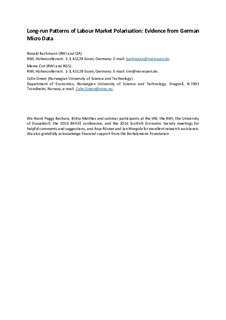| dc.contributor.author | Bachmann, Ronald | |
| dc.contributor.author | Cim, Merve | |
| dc.contributor.author | Green, Colin | |
| dc.date.accessioned | 2019-03-20T12:50:45Z | |
| dc.date.available | 2019-03-20T12:50:45Z | |
| dc.date.created | 2018-05-06T09:34:50Z | |
| dc.date.issued | 2018 | |
| dc.identifier.citation | British Journal of Industrial Relations. 2018, . | nb_NO |
| dc.identifier.issn | 0007-1080 | |
| dc.identifier.uri | http://hdl.handle.net/11250/2590857 | |
| dc.description.abstract | The past four decades have witnessed dramatic changes in the structure of employment. In particular, the rapid increase in computational power has led to large‐scale reductions in employment in jobs that can be described as intensive in routine tasks. These jobs have been shown to be concentrated in middle‐skill occupations. A large literature on labour market polarization characterizes and measures these processes at an aggregate level. However, to date, there is little information regarding the individual worker adjustment processes related to routine‐biased technological change. Using an administrative panel dataset for Germany, we follow workers over an extended period of time and provide evidence of both the short‐term adjustment process and medium‐run effects of routine task‐intensive job loss at an individual level. We initially demonstrate a marked, and steady, shift in employment away from routine, middle‐skill, occupations. In subsequent analysis, we demonstrate how exposure to jobs with higher routine task content is associated with a reduced likelihood of being in employment in both the short term (after one year) and medium term (five years). This employment penalty to routineness of work has increased over the past four decades. More generally, we demonstrate that routine task work is associated with reduced job stability and more likelihood of experiencing periods of unemployment. However, these negative effects of routine work appear to be concentrated in increased employment to employment, and employment to unemployment transitions rather than longer periods of unemployment. | nb_NO |
| dc.description.abstract | Long-Run Patterns of Labour Market Polarisation: Evidence from German Micro Data | nb_NO |
| dc.language.iso | eng | nb_NO |
| dc.publisher | Wiley | nb_NO |
| dc.title | Long-Run Patterns of Labour Market Polarisation: Evidence from German Micro Data | nb_NO |
| dc.type | Journal article | nb_NO |
| dc.type | Peer reviewed | nb_NO |
| dc.description.version | acceptedVersion | nb_NO |
| dc.source.pagenumber | 27 | nb_NO |
| dc.source.journal | British Journal of Industrial Relations | nb_NO |
| dc.identifier.doi | 10.1111/bjir.12419 | |
| dc.identifier.cristin | 1583684 | |
| dc.description.localcode | Locked until 29 May 2019 due to copyright restrictions. This is the peer reviewed version of an article, which has been published in final form at https://doi.org/10.1111/bjir.12419. This article may be used for non-commercial purposes in accordance with Wiley Terms and Conditions for Self-Archiving. | nb_NO |
| cristin.unitcode | 194,60,20,0 | |
| cristin.unitname | Institutt for samfunnsøkonomi | |
| cristin.ispublished | true | |
| cristin.fulltext | postprint | |
| cristin.qualitycode | 2 | |
